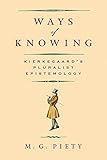Ways of knowing : Kierkegaard's pluralist epistemology / M.G. Piety.
Material type: TextPublication details: Waco, Tex. : Baylor University Press, c2010.Description: xvi, 196 p. ; 24 cmISBN:
TextPublication details: Waco, Tex. : Baylor University Press, c2010.Description: xvi, 196 p. ; 24 cmISBN: - 9781602582620 (hbk. : alk. paper)
- 1602582629 (hbk. : alk. paper)
- 23 230.0922 P626W
- B4378.K56 P54 2010
- B4378.K56 P54 2010
| Item type | Current library | Collection | Call number | Status | Date due | Barcode | |
|---|---|---|---|---|---|---|---|
 Books
Books
|
SAIACS General Stacks | Centre for South Asia Research (CSAR) | 230.0922 P626W (Browse shelf(Opens below)) | Available | 055061 |
Includes bibliographical references and index.
Introduction : Kierkegaard as epistemologist -- The knowing subject -- Defining knowledge -- Objective knowledge -- Redefining knowledge -- Subjective knowledge -- Conclusion : The implications of Kierkegaard's epistemology.
"While Kierkegaard is one of the most important thinkers of the nineteenth century, until now very little scholarly attention has been paid to his epistemology. As M. G. Piety explains, this is a serious problem, as Kierkegaard's views on our ways of knowing are, and must be, intimately related to his view on religious faith and its role in human experience. Thus, in Ways of Knowing, Piety offers the first book-length exploration of Kierkegaard's views on knowledge, an epistemology that she argues is both foundationalist and nonfoundationalist, substantive and procedural, and includes both internalist and externalist theories of belief justification. In developing, then, a general outline of Kierkegaard's views, Piety provides the foundational material for future contextualizing and comparative scholarship"--Pub. info.
There are no comments on this title.

